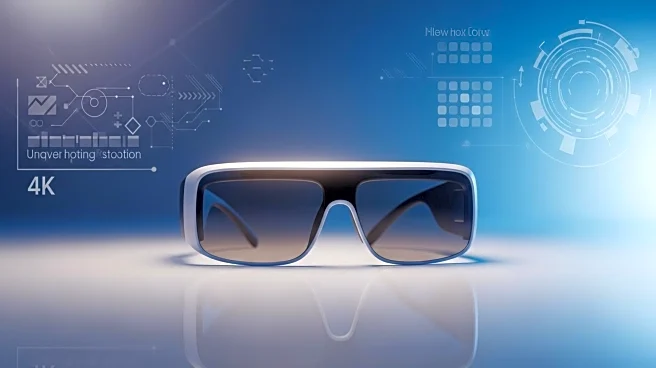What is the story about?
What's Happening?
Several major technology companies are advancing the development of augmented reality (AR) glasses, aiming to transition these devices from prototypes to everyday consumer products. Meta recently unveiled new smart glasses featuring a display and wrist control, while Amazon is reportedly developing its own AR glasses, codenamed 'Jayhawk,' expected to launch between late 2026 and 2027. These developments are part of a broader trend where companies like Apple, Samsung, and Snap are also innovating in the AR space. Apple's recent patent for adaptive lenses suggests a focus on integrating vision correction with AR technology. The market for AR/VR devices is projected to grow significantly, with shipments expected to increase by 39.2% in 2025.
Why It's Important?
The push towards consumer-ready AR glasses represents a significant shift in how technology companies are approaching wearable tech. This move could redefine consumer interactions with digital content, offering new ways to integrate technology into daily life. The competition among tech giants like Meta, Amazon, and Apple is likely to drive innovation and lower prices, making AR technology more accessible to the general public. This could have wide-ranging implications for industries such as retail, healthcare, and entertainment, as AR technology offers new possibilities for immersive experiences and practical applications.
What's Next?
As these companies continue to develop and refine their AR products, consumers can expect a wider range of options and features in the coming years. The success of these devices will depend on factors such as user comfort, battery life, and privacy concerns. Companies will need to address these issues to gain consumer trust and achieve widespread adoption. The market is poised for rapid growth, and the introduction of consumer-friendly AR glasses could lead to new applications and services that leverage this technology.
Beyond the Headlines
The development of AR glasses also raises questions about privacy and data security, as these devices often include cameras and microphones. Companies will need to implement robust security measures to protect user data and address potential ethical concerns. Additionally, the integration of AR technology into everyday life could lead to cultural shifts in how people interact with digital content and each other, potentially changing social norms and behaviors.

















